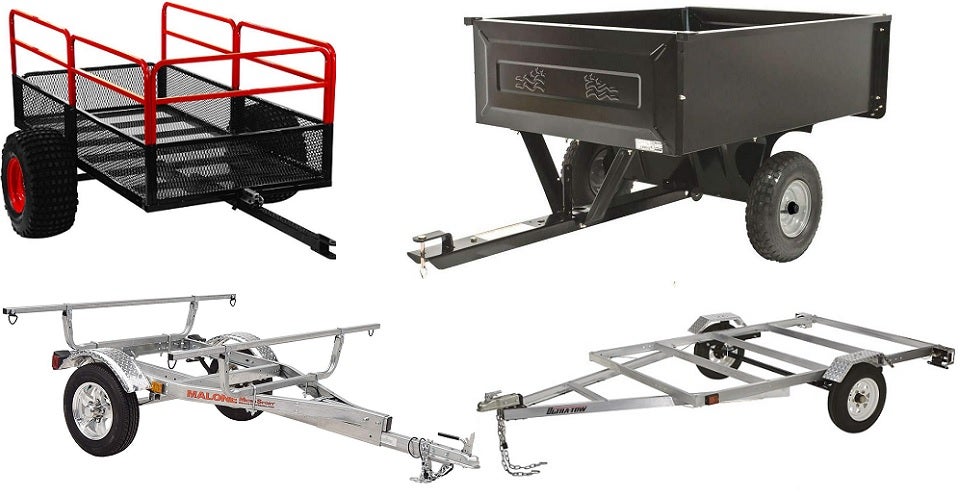
Our Editors independently research, test, and rate what we feel are the best products. We use affiliate links and may receive a small commission on purchases.
If you need to move materials, work or sports equipment, or any particularly large furniture, a great thing to look into is a utility trailer.
Utility trailers make a lot of regular tasks infinitely easier to accomplish.
In this guide, we’ll go over our favorite utility trailers and what they can help you accomplish. At the end, there’s a buyer’s guide with some useful tips, and a frequently asked questions section. Let’s get started!
For more of my home & garden recommendations, have a look through these popular Outside Pursuits guide links: Log Splitters, Pole Saws. Chain Saws, Rototillers.
Quick Answer: The Best Rated Utility Trailers
- MotoAlliance Impact ATV/UTV Utility Cart
- Ultra-Tow Aluminum Utility Trailer
- Yutrax Trail Warrior Heavy Duty UTV/ATV Trailer
- RIGHT-ON TRAILER Multi-Sport Multi-Rack
- Polar Trailer Heavy-Duty Trailer
- Rubbermaid Commercial Tractor Cart
- Malone MicroSport XT Trailer
Utility Trailer Reviews
#1 MotoAlliance Impact ATV/UTV Utility Cart
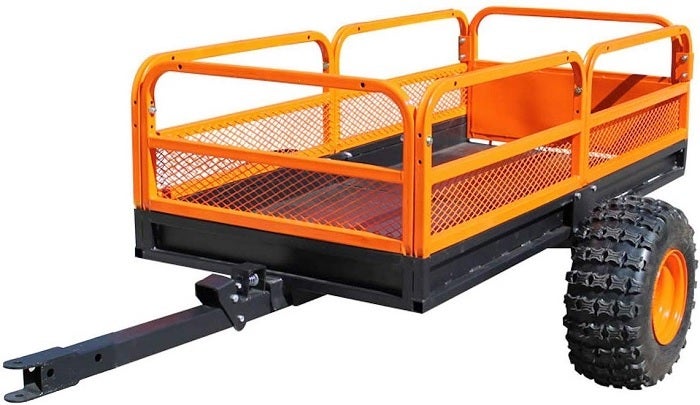
- Weight Capacity: 1,500 pounds
- Cargo Capacity: 15 cubic feet
- Dimensions: 56 x 30 x 13.5 inches
- Trailer Weight: 120 pounds
The MotoAlliance Impact Implements XT1500 ATV/UTV Heavy Duty Utility Cart is a fantastic piece of equipment. No matter how big a job you have to complete, this cart will step up to the task and handle it beautifully.
This is one of, if not the, largest dump cart on the market currently. MotoAlliance didn’t skip out on the quality of this cart during design and manufacturing, either.
With a heavy-duty, 11-gauge steel frame, you will have no need to worry about it being able to support even your heaviest loads. This cart can handle up to 1,500 pounds of weight.
This cart also has some of the biggest wheels on any dump cart. They are heavy, all-terrain wheels that are specifically designed to work well on any terrain.
You can move what you need to over rocky, uneven surfaces or through slick or muddy grass without having to worry about the wheels of this cart getting stuck or breaking.
MotoAlliance has done a great job of designing this piece of equipment, which is arguably the best ATV dump trailer on the market.
The trailer features a removable tailgate and side rails, so you can load this cart up from any angle, making it great for regular dump cart uses as well as making it a fantastic ATV/UTV trailer.
People who purchased this trailer and left reviews seem to love the quality and durability of the trailer itself, but do mention that it is a little difficult to assemble. Be sure to read the manufacturer’s instruction manual, and contact customer service if you need further support!
Keep in mind that MotoAlliance also backs up its Impact Implements products with a limited one-year warranty, as well. It covers manufacturing defects, so if anything is wrong when your product arrives, let them know as soon as possible.
#2 Ultra-Tow Aluminum Utility Trailer
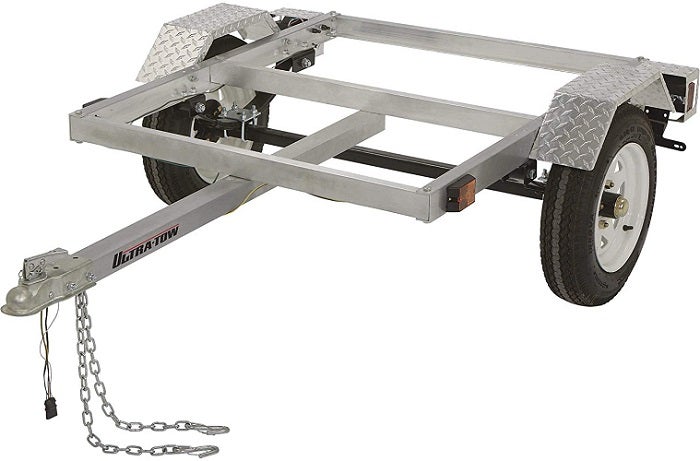
- Weight Capacity: 1,060 pounds
- Cargo Capacity: 40 square feet
- Dimensions: 84 x 40 x 48 inches
- Trailer Weight: 134 pounds
If you need a great small utility trailer, the Ultra-Tow has you covered. This trailer is designed to carry heavier loads. It is wider than standard trailers of the same type.
Decking is not included, but that just means that you can customize this trailer however you like.
This trailer comes to you ready to get on the road and help you haul whatever you can fit on it. It meets all Department of Transportation (DOT) requirements and road-ready specifications.
This trailer has a maximum gross vehicle weight of 1,980 pounds and a maximum payload of 1,060 pounds. With the ability to handle that kind of weight, you shouldn’t have any trouble hauling or moving what you need to.
Built with a rustproof, heavy-duty aluminum frame, this trailer is both tough and lightweight. The fenders of this trailer will protect your cargo from any rocks, debris, or anything else that might come in contact with the frame.
Included in your purchase is a full LED light set with all appropriate wiring. A two-inch coupler and safety chain are also included.
Hooking this trailer up and using it in even dark or foggy conditions won’t be a problem with these additions.
If you are looking for a good utility trailer with a low price as a bonus, this is it! The customer service team for the manufacturer is fantastic and is ready, willing, and able to answer any questions you might have.
#3 Yutrax Trail Warrior X2 Heavy Duty UTV/ATV Trailer
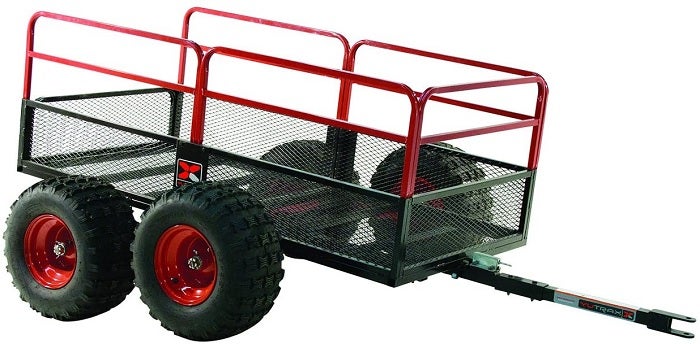
- Weight Capacity: 1,250 pounds
- Cargo Capacity: 20.5 cubic feet with rails attached
- Dimensions: 60 x 31 x 21 inches
- Trailer Weight: 195 pounds
If you need the best ATV trailer out there, you are going to want to look at the Yutax Trail Warrior. Both functional and aesthetically pleasing, you can’t go wrong by considering this trailer as your next purchase.
The Yutrax ATV trailers are designed to handle heavy loads, rough terrain, and hard work. The Trail Warrior is no different. This trailer is built with sturdy, heavy-duty steel parts.
This construction guarantees strength and reliability with even the toughest jobs.
The tailgate and side rails to this trailer are removable. This means you can remove or attach them depending on the load capacity you’re trying to accommodate. The bed also pivots and tilts for easy dumping.
With large flotation tires that sport an impressive grip via the tread, this is by far the best UTV trailer available. Customer reviews report that aside from the attractive aesthetics and impressive features, this trailer is easy to assemble.
#4 RIGHT-ON TRAILER Multi-Sport Multi-Rack
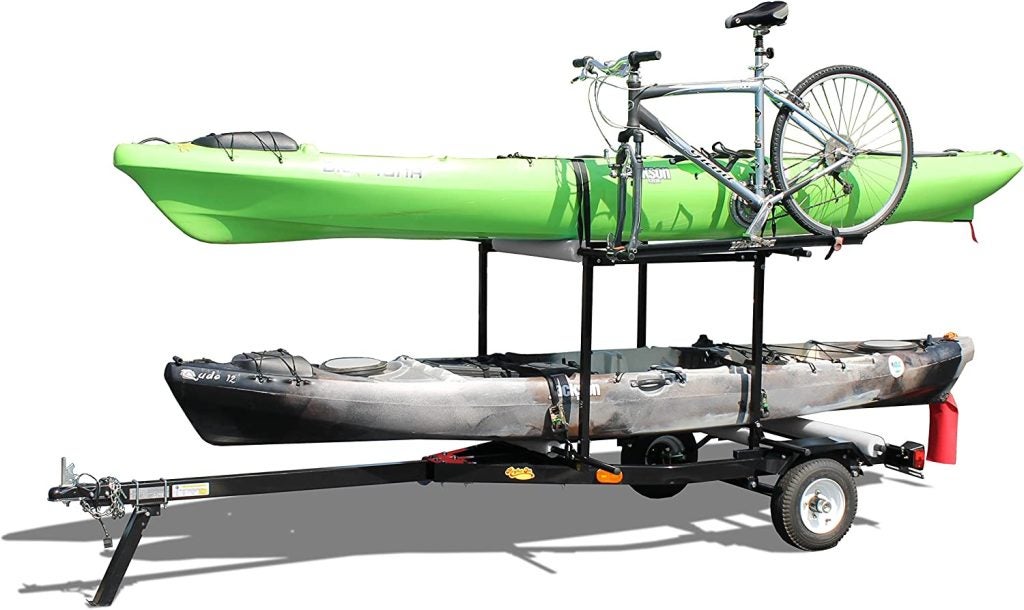
- Weight Capacity: 300 pounds
- Cargo Capacity: Depends on configuration
- Dimensions: 132 x 64 inches
- Trailer Weight: 162 pounds
Solidly-built and easy on the budget, this kayak trailer is great for hauling kayaks as well as smaller equipment like surfboards, bicycles, and more.
The 64-inch crossbars are compatible with both Yakima and Thule accessories, as well. The trailer only weighs 162 pounds on its own, so almost any vehicle should be able to haul it with considerable ease.
It is much more efficient than a rooftop mounted carrier and makes loading and unloading your equipment a breeze.
Right-On is known for having well-priced, attractive, durable trailers whose quality greatly exceeds the pricing, and this trailer is no exception to that standard.
The customer service team is renowned as being fantastic. They are prompt, polite, and helpful with every aspect of your purchase.
This trailer is easy to assemble and is sure to fit your canoe, kayak, and bicycle-related transportation needs!
#5 Polar Trailer Utility Trailer
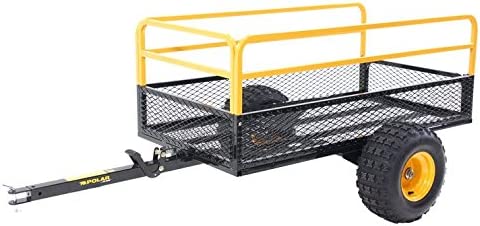
- Weight Capacity: 1,400 pounds
- Cargo Capacity: 23 cubic feet
- Dimensions: 92 x 51 x 36 inches
- Trailer Weight: 165 pounds
Polar is known for making great, universal hauling carts. They can be fixed to any brand of tractor or riding mower with the included hitch pin.
This cart is the perfect tool to help you to complete a variety of yard tasks. From hauling logs and spreading gravel, this steel cart can get it done.
The powder coating on the steel helps to protect it from rust, corrosion, and any other results of exposure or use that might otherwise affect it.
The strong steel bed will easily support and carry up to 1,400 pounds worth of weight. The tough, reinforced pneumatic tires are guaranteed to allow you to get the job done with ease.
They can handle almost any terrain and will easily, confidently withstand any weight that you introduce to the steel bed of the trailer.
This Polar product comes with a quick-release lever for easy, hassle-free dumping of whatever is in the bed. It also sports an 18-gauge removable tailgate for the same reason. It’s an undeniable fact that this cart was built with universal durability and functionality in mind.
Polar offers a three-year limited warranty on their products. Their customer service is reported to be excellent, prompt and polite, as well. So if you need the best lawn mower trailer around, this is the one you want!
#6 Rubbermaid Commercial Tractor Cart
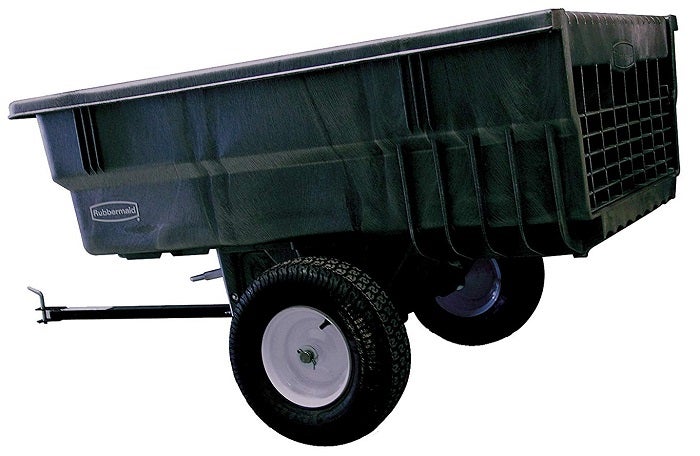
- Weight Capacity: 1,500 pounds
- Cargo Capacity: 15 cubic feet
- Dimensions: 76 x 39.5 x 33.2 inches
- Trailer Weight: 116 pounds
If you’re looking for the best utility trailer on the market, look no further than the FG566361BLA Commercial Tractor Cart from Rubbermaid. It is an incredibly lightweight cart.
Don’t let that fool you though – this cart is extremely durable and promises to work hard for years after your initial purchase.
If you’re wondering how such a powerhouse of a utility cart can be so light, it’s due to the construction and design by Rubbermaid.
The cart is made of heavy-duty structural foam, which is both lightweight and resistant to punctures, scratches, abrasions and other common potential problems.
Using the hefty carbon-steel axle and over-sized pneumatic tires, this cart can be used in any terrain you can haul it across. It won’t tear up yards or sink easily in thick muds or sands, so you can work without worry.
Customers are happy that this cart is lightweight, making it easier to move while empty. You can easily and securely haul everything from branches to dirt, to boulders with this cart.
It can withstand harsh weather conditions if left outside without being damaged by elements like rain, hail and high winds.
#7 Malone MicroSport XT Trailer
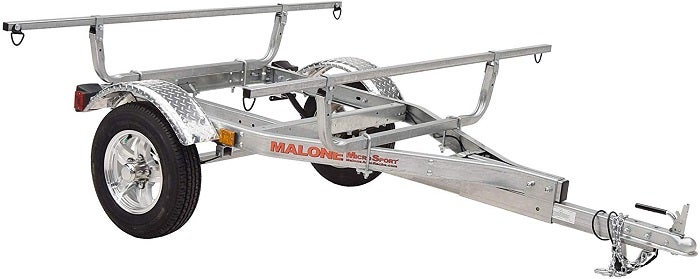
- Weight Capacity: 800 pounds
- Cargo Capacity: 71 square feet
- Dimensions: 65 x 159 inches (102.5 inches when retracted)
- Trailer Weight: 271 pounds
The Malone MicroSport XT Trailer is the best small utility trailer. It is great for a multitude of uses, primarily those involving sporting equipment and gear.
This trailer kit is an upgraded version of the MicroSport Base Trailer kit. It includes the three top-selling accessories at a reduced, bundled price for your convenience, including the LED light kit.
The frame is made of galvanized steel. It can easily support up to 800 pounds. The trailer features a retractable tongue with a convenient lift handle.
This allows the trailer to be stored against a wall in a garage or storage space, taking up as little floor space as possible.
The custom, 12-inch aluminum spoke wheels offer a functional and yet attractive finishing touch to the overall design of this trailer.
Diamond plating on the aluminum fenders finishes off the look while lending itself to impressive durability and resistance to wear and tear.
The XT has DOT-approved lighting and bearings, so you don’t have to worry about getting additional lights or wiring. It also comes with a pre-tested electrical system, pre-fitted chassis components, and 65-inch coated steel load bars.
Designed to assemble in less than three hours, the instructions are thorough and clear. Between the features, ease of assembly, and the impressive five-year warranty, this trailer is a fantastic investment for anyone with sporting equipment.
How to Choose the Best Utility Trailer – Buyers Guide
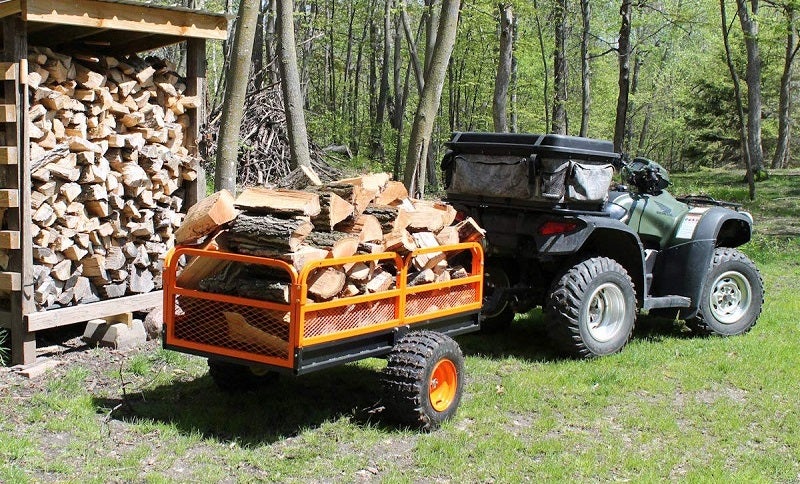
Since purchasing a utility trailer is no cheap endeavor, there are a few things you should take into consideration before making a purchase. Evaluating the following will help properly prepare you for the investment you’re about to make.
Trailer Construction Materials
When it comes to the materials that make up your utility trailer, there are two primary choices. These are aluminum and steel. Both have their pros and cons, so it’s good to know what exactly you will get from either of these material types.
Aluminum
Aluminum tends to be the most common material used in utility trailers. That is because it is lightweight, attractive, and naturally resists corrosion and rust better than steel. It is usually more expensive because of these facts, as well.
However, aluminum isn’t as strong as steel. It is softer and more pliable, and is more difficult to weld. For these reasons, aluminum that is used in aluminum trailers is often actually an aluminum alloy.
Aluminum alloys are approximately 95 percent aluminum that is combined with copper, titanium, chromium, and/or zinc. Alloys are typically stronger, lighter, and still more rust-resistant than steel is, by far. The type of aluminum alloy used for a utility trailer depends on the availability of materials and the price of manufacturing them.
Steel
With improvements headed by the automotive industry, steel has been treated and sold with improvements to make it more resistant to rust. Galvanized steel, for instance, resists both rust and corrosion much better than untreated steel. There are also common options like painting steel with rust-proof paint.
However, you should keep in mind that even though steel is stronger than aluminum, it is also heavier. This means that it will cost more in fuel to tow a steel trailer than an aluminum one.
Galvanized steel lasts longer than aluminum or aluminum alloys, especially when used in trailers. Repairs are much easier, as steel is easier to weld than aluminum is. These new welds are often stronger, increasing the longevity of your trailer.
You may also find carts from companies like Rubbermaid, who make their tractor carts and utility trailers from structural foam. This foam doesn’t rust like metal and alloys can, but it can be punctured or otherwise damaged over time. You may also find plastics and other materials, though those tend to be less common.
Choosing a material for your trailer is about more than the material itself. You should also consider weight, strength, corrosion potential and resistance, cost, and the potential to combine different materials for different parts of the trailer. Some manufacturers already mix and match materials for different components of their utility trailers.
Tires & Wheel Size
As with cars, trucks, or any other vehicle or rolling device, there are different tire types and wheel sizes that your trailer might need. One of the first things you should know how to do is measure your trailer tire. The easiest way to do this is to use the bolt pattern.
- Count the number of lug bolts on one wheel of your trailer. Most trailers will have a pattern of 4 or 5 lug bolts, but heavier duty trailers may have 6 or 8.
- If the trailer has 4, 6, or 8 lug bolts, measuring will be easy. Using a tape measure, ruler, or caliper, measure from the center of one lug bolt to the center of the bolt directly opposite of it.
- If your trailer wheel hub has 5 lug bolts, measuring can seem a little trickier. Choose any bolt and measure from the back of it, across to one near-opposite of it at its center. Make sure you skip at least one of the bolts during this process.
The most common pattern and sizing for the wheels of a utility trailer are 4 lug bolts on a 4-inch hub, and 5 bolts on a 4.5-inch hub. But it’s always a good idea to double-check by measuring.
Once you have the measurement, you will want to know what type of wheel you’ll need for your trailer. Tires for trailers come in three distinct categories.
Bias Ply Tires: These are tires built with plies. Plies are rubber-covered nylon or polyester layers, laid out in 30- to 45-degree angles off the center of the tire. Many of these tires also have fiberglass belts for extra reinforcement. They have rugged sidewalls that help them tolerate extreme conditions and abusive terrain.
Radial Tires: These tires are the most similar to passenger vehicle and light truck tires. They have polyester cords laid and overlapping at 90 degrees off the tire’s center. These tires also have steel mesh belts, providing better flexibility and traction. These tires are particularly great for fuel economy and cooler operation, decreasing the chances of a blowout.
Mounted Tires: These can be either bias ply or radial tires that are mounted on a trailer wheel. The combination makes it easy to replace the tires of your utility trailer.
Road Legality
Department of Transportation (DOT) regulations may vary state by state in regards to what will qualify a trailer as being road-legal. Some, but not all, of these regulations include:
Lights: Standard 108 requires that trailers need to have functioning original or replacement lights. Trailers must have working rear lights, turn lights, and brake lights.
Rear-Impact Guards: Standards 223 and 224, as issued by the National Highway Traffic Safety Administration, specify that trailers are required to have rear impact guards if its gross weight is 10,000 pounds or more.
Tires: Standards 119 and 120 state that the trailer must be equipped with appropriate and proper tires. The tires of a trailer must be of a sufficient size and have the appropriate load rating for the trailer and cargo. Rims must be a particular type and size based on the type of trailer.
If you have any questions for legal requirements, guidelines, and regulations, you should contact your local or state DOT office. Let them know that you’re looking for information on the regulations governing utility trailers, and they will be able to point you in the right direction of what is and isn’t necessary to make your trailer road-legal.
What Purpose or Intended Use do You Have Planned?
A major factor in the type of trailer you buy is how you intend to use the utility trailer you have your eye on. The specs and features that are best for you and your needs are decided based on what type of cargo you plan to haul.
Another determining factor includes how frequently you plan to haul it. Before you buy a utility trailer, think about what you hope to use it for and what that is going to require. For example, larger cargo requires more space, while heavy items need a higher load capacity.
Ask yourself any and all relevant questions. Do you think the trailer needs to be enclosed or should it be open? Will a lower bed height help you to load things on and off? What about a tailgate; do you need one in place or would you like a removable one? These are simple but necessary questions when thinking about your utility trailer needs.
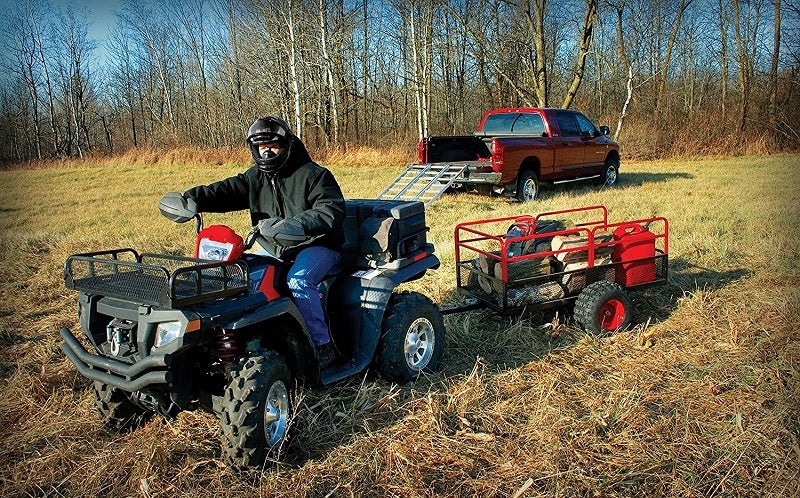
What Kind of Utility Trailer do You Need?
Open trailers tend to have low railings or solid sides that can help contain your cargo. Alternatively, they may have slats or d-rings to secure your equipment. Your utility trailer should be whatever is most ideal for hauling what you need it to.
Enclosed trailers are closed, sporting four walls and a ceiling. This kind of trailer gives you the ability to protect your cargo from any harsh elements. Additionally, enclosed trailers can be locked and secured if you have to leave it unattended, meaning your cargo stays safe.
Single-axle trailers have a single set of wheels, as the title implies. They can haul small items as cargo, like everyday household or yard items. These trailers are usually easier to maneuver due to their light weight. They can be used for a wide variety of small projects.
Tandem axle trailers have two sets of wheels instead of just one. With these trailers, two axles are placed close together as close to the center of the trailer as possible.
This disperses the weight of the cargo and provides impressive shock absorption along with increased maneuverability. These trailers are perfect for hauling heavier loads, like machinery.
Make Sure Your Vehicle Can Haul the Trailer
Another thing to consider is the task of actually transporting the trailer. Will you be using a car or truck to tow the trailer? Every vehicle has a different towing capacity. This capacity limits what the car can haul, and cannot be exceeded. You should also think about the trailer’s ability to handle fast or long-distance travel.
Another consideration would be to ask if fuel efficiency is important to you. When thinking about fuel economy and size, length is better than width for fuel economy as well as visibility and maneuvering.
If your vehicle doesn’t already have a receiving mount for a hitch, make sure that you can mount one. If heavy or fragile items are being hauled, you might also need to add hydraulic or electric brakes to your trailer for safety reasons.
The weight is another primary deciding factor and needs to be accurately considered. Check the gross combined weight rating, or GCWR, to be sure that a trailer and what you plan to haul is compatible with what your vehicle can handle.
For the sake of the towing vehicle’s engine as well as your wallet so you aren’t replacing a trailer and vehicle, locate the maximum towing weight. This is found in the owner’s manual.
Once you know the maximum weight that your vehicle can safely handle towing, subtract the weight of the trailer while it’s empty. The remainder will be the maximum load that your vehicle can handle.
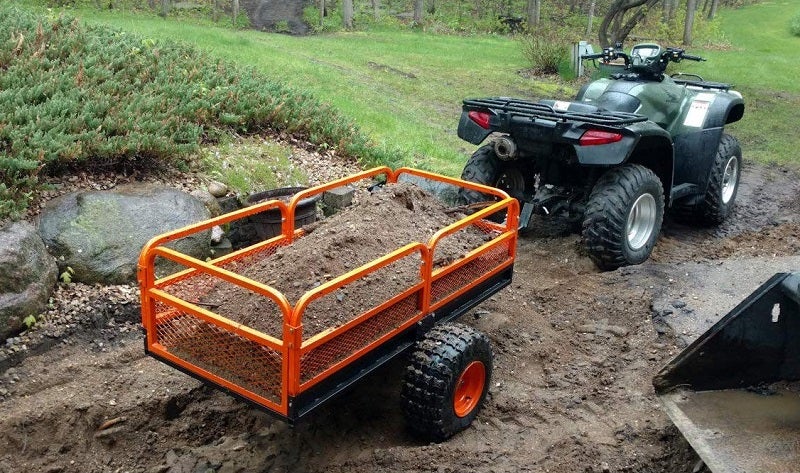
Trailer Storage is Important
The storage of utility trailers is often overlooked. But because utility trailers can be an expensive investment, they need to be maintained to last. Part of that maintenance includes proper storage.
The biggest question to ask yourself is where the trailer will be when it isn’t being used. Will it be stored outside or inside? If the answer is that it will be stored inside, will it need to be tipped on its side to fit in the storage area?
If it’s going to be stored outside, how do you plan to shelter it from wind, moisture, or sunlight? Prolonged exposure to the elements can cause rust, deterioration, warping or general wear. This will ultimately limit your trailer’s lifespan. Storing the trailer outside may also be in violation of local neighborhood ordinances, so you’ll want to be sure.
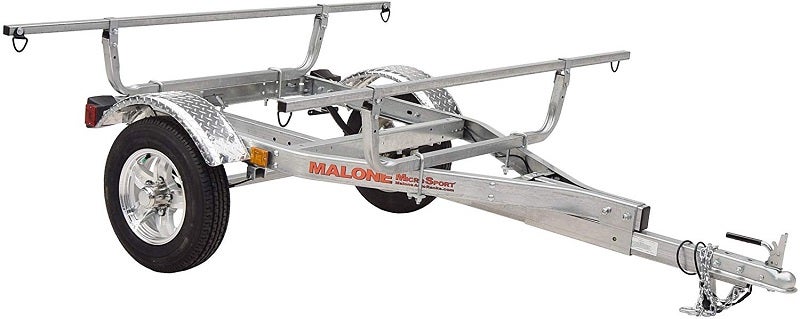
FAQs About Utility Trailers
Q: What are utility trailers used for?
A: Utility trailers have many uses. Depending on the size of your trailer as well as the type, you can do almost anything as long as your vehicle can handle hauling the trailer and its load.
Here are some common uses for utility trailers:
- Lawn Care: From moving lawnmowers and other maintenance equipment to hauling and spreading dirt or mulch, the right utility trailer can make any lawn care and maintenance a breeze. No more need to worry about pushing around heavy wheelbarrows or carrying huge bags of material.
- Debris, Firewood, and Trash: Many people get small utility trailers to handle these tasks. If you use an ATV or truck to clean up a job site or gather firewood, a utility trailer can make the job a lot easier. It also keeps debris and trash out of your personal vehicles, which is a great reason all on its own.
- Kayaks, Bicycles, and More: You can use a utility trailer to load and unload recreational equipment, instead of having to mount it on the top of your vehicle and often having to struggle to remove or return it. Utility trailers are great for everything: bicycles, motorcycles, canoes, kayaks, boats, and even cars.
These are just some of the uses people buy utility trailers for. Many people buy utility trailers for one or two infrequent tasks. Once the trailer arrives, though, people often realize how many other tasks they can use the trailer for.
The investment is more than worth it for such a versatile piece of equipment. If you need to haul it, there’s a utility trailer that can help.
Q: Is there a difference between ATV/UTV trailers and a utility trailer?
A: While some trailers can be used for both ATV/UTV and utility use, not all that are advertised to handle such a task actually should. Essentially, what it boils down to is this: All ATV trailers can be utility trailers, but not all utility trailers can be ATV trailers.
For hauling ATVs, size isn’t only important, but the dimensions that make that size up count. ATV trailer beds are usually five to seven-feet wide.
ATVs get loaded onto trailers from a sideways angle for convenience and security. Utility trailers tend to load from the back rather than the side, making it inconvenient and downright unsafe at times to load an ATV onto one. ATV trailers are designed and built to have lower, curved or no railing at all.
ATV trailers tend to be shorter, designed to load multiple ATVs from the side, whereas utility trailers can be as short or long as necessary for job completion and functionality. Utility trailers are also meant to hold their cargo securely inside, where in contrast, ATV trailers are made to be able to drive your ATV on and off of the trailer.
Contrarily, some manufacturers label an ATV trailer as one that fits a hitch on an ATV, for the ATV to haul for small projects or moving smaller amounts of something that maybe don’t require a full-sized utility trailer. Make sure you check the dimensions, weight capacities, and function before purchasing a trailer.
Get the trailer that suits your needs and has as much versatility as you might need.
Q: What should I look for when buying a utility trailer?
A: When buying your trailer, there are some basic things to consider like price, warranty, quality of customer service, and applicable use that generally apply to any purchase, not just trailers. With trailers and specifically utility trailers that you may need for particular purposes, other factors should be considered.
Consider the uses you have in mind. Are you hauling dirt or a kayak? Do you need a wider trailer for ATV use, or a longer trailer to move furniture? Do you need a trailer for a specific task or series of tasks, or do you think you’ll need more versatility?
Once you figure out the purpose of needing a trailer, the rest kind of falls into place. Consider things like length and width of the trailer and what, if any, limitations exist in your location regarding trailer dimensions.
Make sure your vehicle can tow the weight of the trailer easily, with plenty of extra weight hauling potential for the weight of whatever you intend to actually put on the trailer. Make sure that your vehicle can support a hitch being mounted to it, and make sure the hitch is compatible with the trailer.
With these things in mind, you can make the best decision on what trailer will suit your needs.
Q: How much can a utility trailer haul?
A: Every trailer is built differently, and every vehicle has different hauling capabilities, so you should take both of these things into consideration before trying to determine how much your trailer can handle.
Aside from what the manufacturer advertises during your shopping experience, and especially in the case of buying a used trailer, there’s an easy way to check your trailer’s hauling ability. On the plate or sticker where the VIN number is, there should be a weight rating for the trailer’s axle.
The axle itself could also have a tag or sticker that will list the weight capacity, so be sure to check.
The axle’s weight capacity can also be estimated by the diameter of the axle itself. Typically, axle weight capacities in relation to their diameter are as follows:
- 2,000-lb = 1-1/2 inch – 1-3/4 inch diameter
- 3,500-lb = 2-3/8 inch diameter
- 6,000-lb – 7,200-lb = 3 inch diameter
- 8,000-lb = 3-1/2 inch diameter
- 9,000-lb = 4 inch diameter
- 10,000-lb Or more = 5 inch diameter
Q: How long should a trailer tongue be?
A: In most instances, a good rule of thumb for the length of a utility trailer tongue is for it to be at least as long as half of the towing vehicle’s width. You may want it to be an additional eight to twelve inches longer for added stability, and to give a margin of clearance during turns.
Keep in mind that the tongue is one of the most important components of your trailer. If it is too small or is constantly overburdened beyond its suggested carrying weight, the stress will begin to cause microscopic cracks in the grain of the tongue. This will eventually lead to breaking and failure, which can be catastrophic and may ultimately damage the load it was carrying as well.
Q: How much does a utility trailer cost?
A: This of course depends on the size, load capacity and the materials it is made with. A small utility trailer of 4′ x 6′ such as the Yutrax that can carry 1,500 pounds will cost under $500
Q: Is a utility trailer a good investment?
A: Most definitely! If you haul cargo around your house or transport cargo work work a utility trailer is a very worthwhile investment.
Q: Do utility trailers need license plates?
A: If you plan on taking the trailer on public roads you will need to register it and get a license plate. If you just use it around your house you do not need a license plate.
Q: Do I need to insure a utility trailer?
A: If you are using it for personal use, you should not need to insure it separatly, your existing auto policy should cover it. However, you should check with them to verify.
Q: Do I need a utility trailer?
A: If you need to haul large, bulky items around, a utility trailer is a necessity. Instead of packing it in the back of your SUV or trunk of your car, a trailer will make these tasks much easier.
How We Researched
To come up with the top utility trailers, we researched a variety of sources for reviews such as 4×4 Magazine and Outside Online Magazine along with our own personal experience.
We also consulted online magazines for product research and reviews to get as much unbiased information as we could. To help weed out fake reviews we used Fakespot.com to make sure we only looked at genuine reviews.
With so much quality gear available, we had to narrow it down based on what we felt were the best options were for the price. The staff authors have a wide and varied background in offroading, motorcycling, and auto mechanics. They are eager to share their knowledge with readers.
To help narrow down the selection we used personal experiences along with recommendations from fellow auto-enthusiasts and industry experts.
After extensive research, we came up with our list to help you choose the right one for you.
